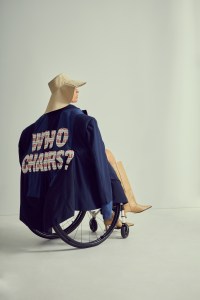“Who chairs?”
That wry, yet poignant slogan was writ large on an oversized blazer propped on the shoulders of a seated model and the push handles of her wheelchair. The thought-provoking design helped Swedish designer Louise Linderoth, who suffered a spinal-cord injury at age 10, win the 2022 edition of what may be the world’s biggest international competition for inclusive design.
“Ableism is rooted in language,” Linderoth explained, which is why she also playfully spelled out her rebuke to ancient beliefs that disabilities were like the flu. “Highly uncontagious” repeats on the elastic waistbands she repurposed as straps on plunging tops. Her trucker hat slogan? “Cap-Able.”

A 2022 look by Swedish fashion designer Louise Linderoth.
Courtesy of Louise Linderoth
Now Linderoth is returning as a jury member and will help decide on the 2024 winner of the Grand Prix Inclusive Design, quietly established five years ago by online talent platform Eyes on Talents in concert with sustainable fashion body Paris Good Fashion and advocacy group APF France Handicap.
The biennial competition is opening the worldwide call for applications for its third edition Friday. Deliberations are to commence mid-May with the next winner to be revealed on June 13 in the French capital.
Paris-based executive search specialist Floriane de Saint Pierre, who founded Eyes on Talents a decade ago as an online platform for connecting brands with international design talents, said the competition’s objective is to coax creative designs addressing differently abled people, whether via function or an aesthetic reconsideration of an existing object.
“Our dream is to help such projects and talent not only with recognition and visibility, but in accessing brands, and meaningful partnerships for production and distribution,” de Saint Pierre told WWD in an interview.
She enthused that the 2024 competition is “very special as it takes place during the year of the Olympics and Paralympics Games in Paris. We anticipate amazing projects.”
The Grand Prix Inclusive Design comes with a 10,000 euro grant, provided by APF France Handicap and its partners, along with visibility via the digital channels of Eyes on Talents and jury members.
Indeed, the award process is also meant to foster “a broader movement” toward inclusive design.
“By recognizing and promoting projects that consider diverse needs and bodies, the award encourages other designers and companies to adopt inclusive practices,” de Saint Pierre explained. “This can lead to a more diverse and accessible range of products and services, benefiting both the creative industries and society as a whole.”
For example, Yoosung Kim, a Korean designer who merited special jury mention during the 2022 edition, created a customizable sneaker with a lacing system and sole adapted to the motor skills of people with cerebral palsy. He went on to win several other prizes, including a James Dyson Award and an International Busan Design Award. He now works at Nike’s innovation kitchen.
Inclusive design innovations can also trickle out to a wider population.
For example, the 2019 winner Lucy Jones developed an ingenious clipping mechanism that wheelchair users can use to attach leather accessories and drinking cups that proved equally suitable for baby strollers and the like.
De Saint Pierre noted that apparel with magnetic closures, slip-on shoes and adjustable clothing, initially created for people with limited dexterity, prosthetics or one-handed mobility, are now appreciated by a broader audience for their convenience and adaptability.
Designers of any seniority can apply for the Grand Prix Inclusive Design, with the jury evaluating the quality of the design and the impact of the solution.
“I hope to see a lot of problem-solving,” Linderoth said when asked about this year’s award hopefuls.
A 2017 graduate of the Swedish School of Textiles, part of the University of Borås, Linderoth confessed she has an allergy to things like hidden Velcro and prefers when designers “enhance differences and adaptations rather than hiding them.”
She applauded the design competition for bringing attention to emerging designers, and encouraging social discourse around ableism. For Linderoth, winning the award yielded many requests, including a speaking engagement at a Frida Kahlo exhibition and conference at the Palais Galliera in Paris in 2022.
For the 2024 edition of the Inclusive Design Award, de Saint Pierre assembled a jury stacked with fashion professionals including Pascal Morand, executive president of the Fédération de la Haute Couture et de la Mode; Xavier Romatet, dean of the Institut Français de la Mode; Berlin-based art director Donald Schneider; former Meta executive Morin Oluwole; and Camille Hutin, general manager of Chanel-owned La Galerie 19M.
Rounding out the jury are de Saint Pierre; her Eyes on Talent partner Astrid de Montessus; Paris Good Fashion cofounder Isabelle Lefort, and Serge Wildawski, chief executive officer of APF France Handicap, the oldest advocacy group for disabled people in France.
De Saint Pierre, who operates a namesake executive search and consulting firm, has widened her core expertise of “human capital” to the Eyes on Talents platform, billed as the industry’s largest talent pool for fashion, design and creative services, and Ethics & Boards, which offers advanced benchmarking, scoring and advisory capabilities regarding corporate governance and board issues.
Eyes on Talents and Paris Good Fashion also organize a biennial prize for photography and sustainability.

